Search the Special Collections and Archives Portal
Search Results
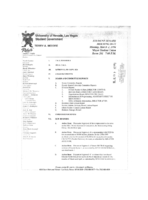
Meeting minutes for Consolidated Student Senate University of Nevada, Las Vegas, March 2, 1998
Date
Archival Collection
Description
Text
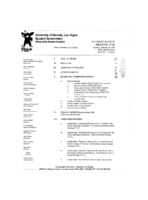
Meeting minutes for Consolidated Student Senate University of Nevada, Las Vegas, February 10, 1997
Date
Archival Collection
Description
Text
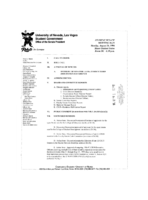
Meeting minutes for Consolidated Student Senate University of Nevada, Las Vegas, August 26, 1996
Date
Archival Collection
Description
Text
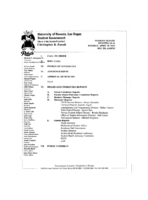
Meeting minutes for Consolidated Student Senate, University of Nevada, Las Vegas, April 28, 2003
Date
Archival Collection
Description
Text

Meeting minutes for Consolidated Student Senate University of Nevada, Las Vegas, January 31, 1985
Date
Archival Collection
Description
Text
Martinez, Jose Leonardo, 1971-
For Leonardo Martinez, the United States was never meant to be a destination—it was merely a short stop along the way as he awaited the day he could safely return to his family in El Salvador. Now a man who embraces the occasional Big Mac from McDonalds but never turns away a Salvadoran pupusa, Leonardo has embraced both places as home with memories that took him from his humble upbringings in Santa Lucía to the bright lights of the city of Las Vegas.
Person
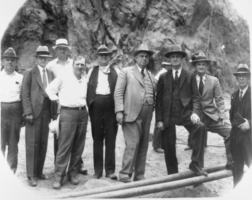
Film transparency of businessmen, politicians, and engineers at Hoover Dam, June 6, 1933
Date
Archival Collection
Description
Image
Jack Kent Tillar Papers
Identifier
Abstract
The Jack Kent Tillar Papers (approximately 1890-2010) are comprised of magic-related books, periodicals, pamphlets, ephemera, and artifacts from the estate of Jack Kent Tillar who was a composer and music editor for the film and television industry. Materials also include a small amount of Tillar's personal papers. Tillar was an amateur mentalist magician and wrote numerous books and articles on the subject of telepathy and mentalism including
Archival Collection
Sidney R. Whitmore Collection
Identifier
Abstract
The Sidney R. Whitmore Collection (approximately 1885-1970) contains land deeds and other documents about Mount Diablo, Nevada; documents detailing parts of his family history; and eight framed paintings of landscapes and portraits.
Archival Collection

Yazmin Beltran oral history interview: transcript
Date
Archival Collection
Description
Oral history interview with Yazmin Beltran conducted by Rodrigo Vazquez and Barbara Tabach on February 4, 2019 for the Latinx Voices of Southern Nevada Oral History Project. Beltran discusses her early life in Mexicali, Baja California, Mexico and her childhood and upbringing in Mexico. In 2003, at the age of eighteen, she and her mother joined the rest of her family in Las Vegas, Nevada. After attending College of Southern Nevada and taking English as a Second Language classes, Yazmin began to write as a Spanish contributor for a publication in Reno, and became a writer for Spanish publications in Las Vegas, including El Tiempo, El Mundo, and Univision. Beltran's work for Univision led her to Texas, where she covered events and crises including the 2018 child separation occurring at the United States border, which she discusses in the interview. Finally, Beltran talks about being a journalist for The Nevada Independent and the importance of continuing to report in Spanish.
Text
